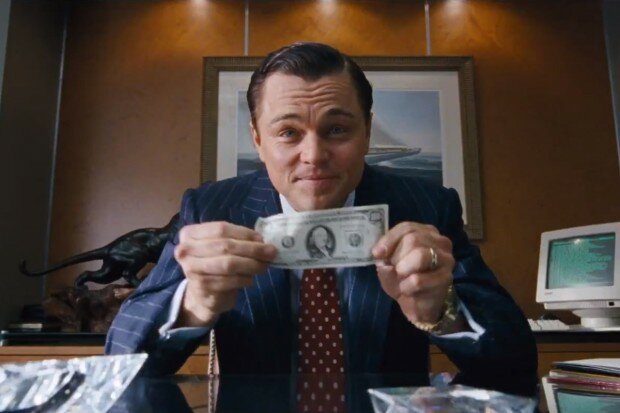It’s Christmas Day, and Martin Scorsese’s “Wolf of Wall Street” was released in all of its anti-holiday glory.
Thankfully, I waited a few days to see it, so I didn’t march out of the theater in Christmas spirit outrage. It was 180 minutes (THAT’S THREE HOURS) of drug use, strippers, and a whole lot of other debauchery that was so outlandish I stayed right in my seat and watched the entire thing.
The main character, Jordan Belfort (played by Leonardo Dicaprio), is a money-crazed drug addict who defrauds investors and makes millions off of the profits. When his actions finally catch up to him, he rats out all of business associates/friends involved in the scheme and lowers his sentence to three years. A measly prison sentence that in no way shape or form compensates for the hardship that fell upon his swindled victims.
There was no happy ending, no obvious moral to the story, nothing but a terrifying glimpse into the life of a greedy, power-hungry man who terrorized both small and large business owners. I waited the entire time for justice, for the light to shine through the clouds coming of age moment where Jordan Belfort would become a person with morals and crawl back home to his trophy wife sunning herself on the 170-foot yacht. But that moment never came.
I went home, researched the movie, and discovered that the entire thing was based off an autobiography. That Jordan Belfort was a real person, who indeed conned his way into making millions of dollars at the expense of other people. And according to Time Magazine, who graciously fact checked some of the more outrageous elements of the story, Belforts first boss actually did tell him that the keys to success were masturbation, cocaine, and hookers. He did sink his beloved yacht, he crashed a helicopter into his own front lawn while high, and some of his office parties involved tossing midgets.

Via: nymag.com
Suddenly, the entire thing made sense. Of course there was no happy ending. Of course the story wasn’t wrapped up neatly and tied with a red ribbon, gifted to the audience as an escape into a perfect fictional world. I couldn’t go home feeling consoled that real justice was placed on a criminal, or that he woke up one day and felt sorry for everything he did. I went home feeling slightly depressed, slightly pissed at Martin Scorsese for making me giggle at Belfort’s crazy behavior thinking that it was all right to laugh, he would get what he deserved in the end.
In real life, that doesn’t necessarily happen.
Christina McDowell was the daughter of Tom Prousalis, a businessman who was involved with Jordan Belfort’s crimes. She wrote a letter of outrage to LA Weekly in response to the film, where she openly criticized Leonardo Dicraprio and Martin Scorsese for condoning the behavior of her father and his friends.
“Anyhow, after my father successfully laundered money in my name, hiding what was left of our assets from the government in a Wells Fargo bank account, I arrived home to discover multiple phone calls from creditors and attorneys threatening to sue me. He’d left me in nearly $100,000 worth of debt. He left and never told me.”
“You were honored for career excellence and for your cultural influence by the Kennedy Center, Marty. You drive a Honda hybrid, Leo. Did you think about the cultural message you’d be sending when you decided to make this film? You have successfully aligned yourself with an accomplished criminal, a guy who still hasn’t made full restitution to his victims, exacerbating our national obsession with wealth and status and glorifying greed and psychopathic behavior.”
From Christina’s perspective, the film places Jordan Belfort’s and her fathers’ actions into good lighting, as though their lack of morals was attractive and appealing to the audience. And in a way, it was. I knew everything I was watching was bad. I knew the drugs were wrong, the cheating, and the strippers, the stealing. Almost every single scene disgusted me, but I paid the ten dollars to see it and I watched the entire movie. It was entertaining.

Via: hollywoodreporter.com
And that’s what’s bad. That we allow ourselves to get sucked in to that kind of life, even if it just means sitting in a movie theater. In my opinion, this is what Martin Scorsese was trying to show us. How easy it is to become wrapped up in our own greed, or to watch others with unabashed envy. It’s something that we, as a culture, need to rise above.
So it’s up to you, as the audience, to decide where you think Scorsese was coming from. Was he condoning this lifestyle under the mask of an objective perspective? Was he making a movie so morally disgusting on purpose, just to make a profit? Or was he showing us how weak we are, how easily we succumb to greed?





